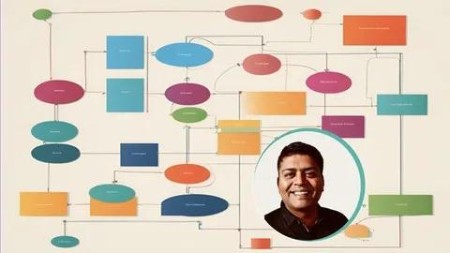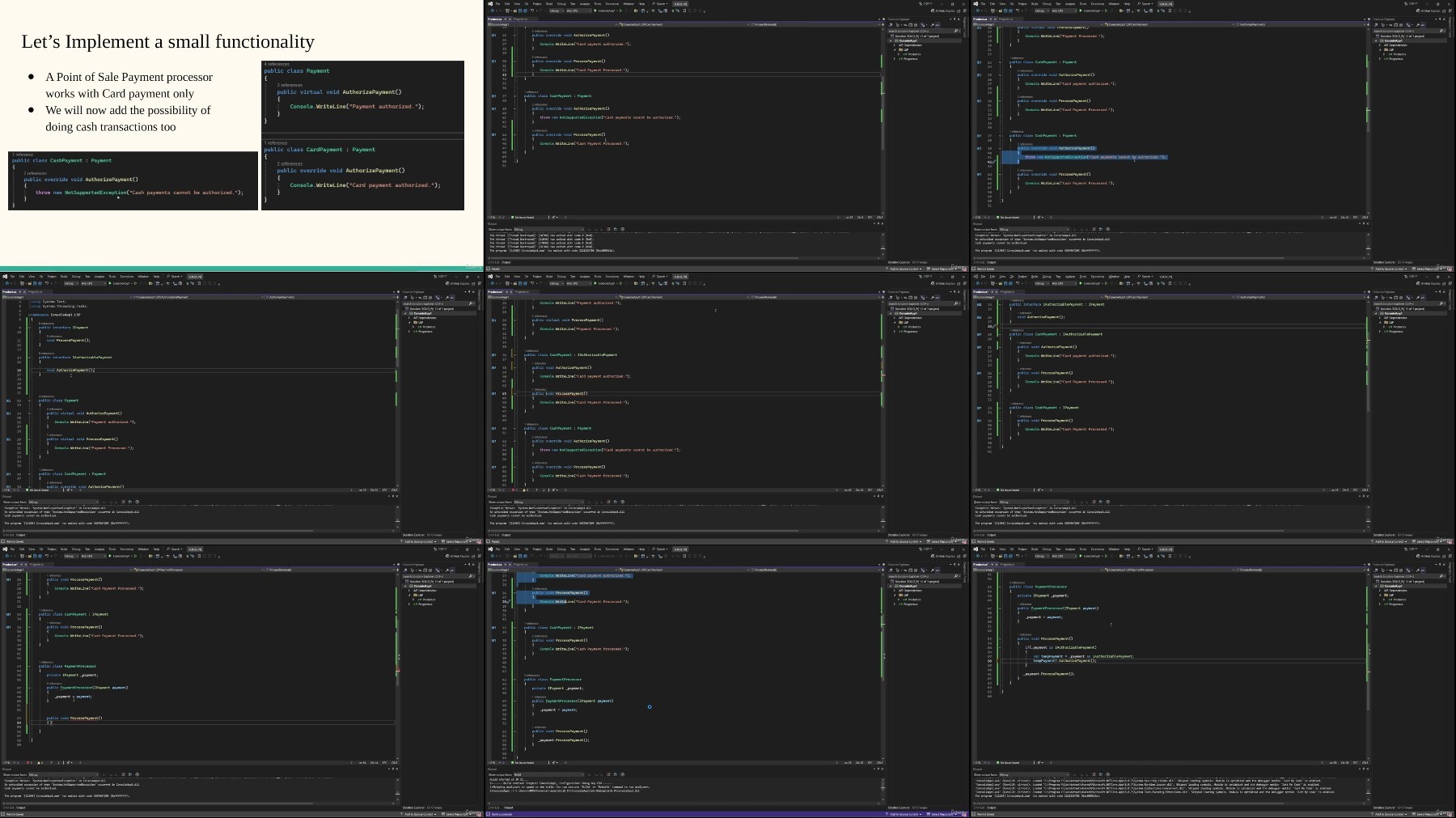Mastering Solid Principles Of Object Oriented Design (C#)

Mastering Solid Principles Of Object Oriented Design (C#)
Published 9/2024
MP4 | Video: h264, 1920x1080 | Audio: AAC, 44.1 KHz
Language: English | Size: 703.27 MB | Duration: 2h 7m
Master SOLID principles using C#. Learn to write maintainable, scalable, and robust code through practical examples.
What you'll learn
Understand and effectively apply the five SOLID principles (SRP, OCP, LSP, ISP, DIP) in your software design to create clean, maintainable, and scalable code.
Learn techniques to refactor and improve existing codebases, ensuring better readability, reduced technical debt, and easier maintenance.
Develop skills to design software systems that can adapt to changing requirements with minimal impact, promoting long-term project success.
Create modular and reusable code components, allowing for efficient development and integration across different projects and systems.
Requirements
Basic Programming Knowledge
Experience with Object-Oriented Programming (OOP)
Understanding of Basic Software Development Concepts
Description
Unlock the full potential of your C# programming skills with our comprehensive course on mastering SOLID principles. SOLID is an acronym for five foundational principles of object-oriented design that ensure your code is maintainable, scalable, and robust. These principles include Single Responsibility, Open/Closed, Liskov Substitution, Interface Segregation, and Dependency Inversion.Throughout this course, you'll dive deep into each of these principles with detailed explanations and practical examples tailored for C# developers. You'll learn to identify and address common design issues, transforming your approach to software development. Through hands-on exercises, you'll gain the skills to apply these principles effectively in real-world projects, enhancing your ability to write clean, efficient, and adaptable code.This course is designed for developers at all levels, from beginners to seasoned professionals. If you're new to object-oriented programming, you'll gain a strong foundation in SOLID principles, setting you up for success in your programming career. Experienced developers will benefit from a deeper understanding and refinement of their coding practices, leading to more efficient and reliable software.By the end of this course, you'll have a solid grasp of how to implement SOLID principles in your C# projects, leading to better software development practices. Join us and elevate your coding proficiency, ensuring your applications are robust, flexible, and easy to maintain. Embrace the power of SOLID principles and revolutionize your software design with this essential course.
Overview
Section 1: Introduction
Lecture 1 Introduction to the Course
Lecture 2 Overview of SOLID Principles
Section 2: Single Responsibility Principle (SRP)
Lecture 3 What is Single Responsibility Principle
Lecture 4 Understanding and identifying SRP violation and fixing it - Code example
Lecture 5 Benefits of conforming to Single Responsibility Principle
Section 3: Open/Closed Principle (OCP)
Lecture 6 What is Open-Closed Principle
Lecture 7 Understanding and Identifying OCP violation and fixing it - Code example
Lecture 8 Benefits and importance of Open-Closed Principle
Section 4: Liskov Substitution Principle (LSP)
Lecture 9 What is Liskov Substitution Principle (LSP)
Lecture 10 Understanding and Identifying LSP violation and fixing it - Code example
Lecture 11 Benefits and importance of Liskov Substitution Principle (LSP)
Section 5: Interface Segregation Principle (ISP)
Lecture 12 What is Interface Segregation Principle (ISP)
Lecture 13 Understanding and Identifying ISP violation and fixing it - Code example
Lecture 14 Benefits and importance of Interface Segregation Principle (ISP)
Section 6: Dependency Inversion Principle (DIP)
Lecture 15 What is Dependency Inversion Principle (DIP)
Lecture 16 Understanding and Identifying DIP violation and fixing it - Code example
Lecture 17 More Topics closely related to DIP
Lecture 18 Benefits and importance of Dependency Inversion Principle (DIP)
Section 7: Summary and what next
Lecture 19 Summary and what next
Aspiring Software Developers,Experienced Developers Seeking to Improve Design Skills,Students in Computer Science or Software Engineering,Software Architects and Team Leads

What you'll learn
Understand and effectively apply the five SOLID principles (SRP, OCP, LSP, ISP, DIP) in your software design to create clean, maintainable, and scalable code.
Learn techniques to refactor and improve existing codebases, ensuring better readability, reduced technical debt, and easier maintenance.
Develop skills to design software systems that can adapt to changing requirements with minimal impact, promoting long-term project success.
Create modular and reusable code components, allowing for efficient development and integration across different projects and systems.
Requirements
Basic Programming Knowledge
Experience with Object-Oriented Programming (OOP)
Understanding of Basic Software Development Concepts
Description
Unlock the full potential of your C# programming skills with our comprehensive course on mastering SOLID principles. SOLID is an acronym for five foundational principles of object-oriented design that ensure your code is maintainable, scalable, and robust. These principles include Single Responsibility, Open/Closed, Liskov Substitution, Interface Segregation, and Dependency Inversion.Throughout this course, you'll dive deep into each of these principles with detailed explanations and practical examples tailored for C# developers. You'll learn to identify and address common design issues, transforming your approach to software development. Through hands-on exercises, you'll gain the skills to apply these principles effectively in real-world projects, enhancing your ability to write clean, efficient, and adaptable code.This course is designed for developers at all levels, from beginners to seasoned professionals. If you're new to object-oriented programming, you'll gain a strong foundation in SOLID principles, setting you up for success in your programming career. Experienced developers will benefit from a deeper understanding and refinement of their coding practices, leading to more efficient and reliable software.By the end of this course, you'll have a solid grasp of how to implement SOLID principles in your C# projects, leading to better software development practices. Join us and elevate your coding proficiency, ensuring your applications are robust, flexible, and easy to maintain. Embrace the power of SOLID principles and revolutionize your software design with this essential course.
Overview
Section 1: Introduction
Lecture 1 Introduction to the Course
Lecture 2 Overview of SOLID Principles
Section 2: Single Responsibility Principle (SRP)
Lecture 3 What is Single Responsibility Principle
Lecture 4 Understanding and identifying SRP violation and fixing it - Code example
Lecture 5 Benefits of conforming to Single Responsibility Principle
Section 3: Open/Closed Principle (OCP)
Lecture 6 What is Open-Closed Principle
Lecture 7 Understanding and Identifying OCP violation and fixing it - Code example
Lecture 8 Benefits and importance of Open-Closed Principle
Section 4: Liskov Substitution Principle (LSP)
Lecture 9 What is Liskov Substitution Principle (LSP)
Lecture 10 Understanding and Identifying LSP violation and fixing it - Code example
Lecture 11 Benefits and importance of Liskov Substitution Principle (LSP)
Section 5: Interface Segregation Principle (ISP)
Lecture 12 What is Interface Segregation Principle (ISP)
Lecture 13 Understanding and Identifying ISP violation and fixing it - Code example
Lecture 14 Benefits and importance of Interface Segregation Principle (ISP)
Section 6: Dependency Inversion Principle (DIP)
Lecture 15 What is Dependency Inversion Principle (DIP)
Lecture 16 Understanding and Identifying DIP violation and fixing it - Code example
Lecture 17 More Topics closely related to DIP
Lecture 18 Benefits and importance of Dependency Inversion Principle (DIP)
Section 7: Summary and what next
Lecture 19 Summary and what next
Aspiring Software Developers,Experienced Developers Seeking to Improve Design Skills,Students in Computer Science or Software Engineering,Software Architects and Team Leads

